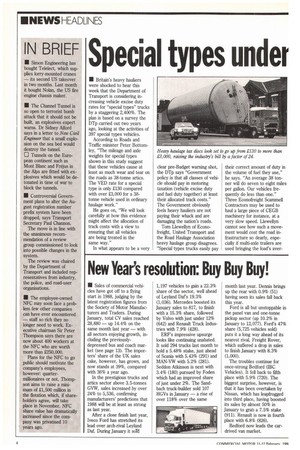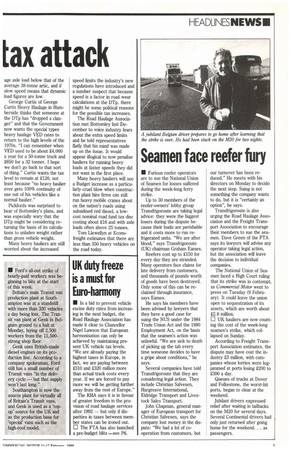Special types under tax attack
Page 14

Page 15

If you've noticed an error in this article please click here to report it so we can fix it.
• Britain's heavy hauliers were shocked to hear this week that the Department of Transport is considering increasing vehicle excise duty rates for "special types" trucks by a staggering 2,400%. The plan is based on a survey the DTp carried out two years ago, looking at the activities of 397 special types vehicles.
According to Roads and Traffic minister Peter Bottomley, —The mileage and axle weights for special types shown in this study suggest that these vehicles cause at least as much wear and tear on the roads as 38-tonne artics. The VED rate for a special type is only 2130 compared with over 23,000 for a 38tonne vehicle used in ordinary haulage work."
He goes on, "We will look carefully at how this evidence might affect the allocation of track costs with a view to ensuring that all vehicles are being treated in the same way."
In what appears to be a very clear pre-Budget warning shot, the DTp says "Government policy is that all classes of vehicle should pay in motoring taxation (vehicle excise duty and fuel duty together) at least their allocated track costs." The Government obviously feels heavy hauliers are not paying their whack and are damaging the nation's roads.
Tom Llewellyn of Econofreight, United Transport and the Road Haulage Association heavy haulage group disagrees. "Special types trucks easily pay their correct amount of duty in the volume of fuel they use," he says. "An average 38 tonner will do seven to eight miles per gallon. Our vehicles frequently do less than one." Three Econofreight Scammell Contractors may be used to haul a large piece of CEGB machinery for instance, at a very slow speed. Llewellyn cannot see how such a movement would cost the road infrastructure so dearly, especially if multi-axle trailers are used bringing the load's aver age axle load below that of the average 38-tonne artic, and if slow speed means that dynamic load figures are low.
George Curtis of George Curtis Heavy Haulage in Humberside thinks that someone at the DTp has "dropped a clanger" and that the Government now wants the special types heavy haulage VED rates to return to the high levels of the 1970s. "I can remember when VED used to be about 24,000 a year for a 50-tonne truck and £850 for a 32 tomer. I hope we don't go back to that sort of thing." Curtis wants the tax level to remain at £130, not least because "no heavy haulier ever gets 100% continuity of use out of his vehicles like a normal haulier."
Pickfords was surprised to hear of Bottomley's plans, and was especially wary that the DTp might be considering returning the basis of its calculations to unladen weight rather than gross vehicle weight.
Many heavy hauliers are still worried about the increased speed limits the industry's new regulations have introduced and a number suspect that because speed is a factor in road wear calculations at the DTp, there might be some political reasons for the possible tax increases.
The Road Haulage Association met Bottomley last December to voice industry fears about the extra speed limits and he told representatives flatly that his mind was made up on the issue. It would appear illogical to now penalise hauliers for running heavy loads at faster speeds they did not want in the first place.
Many heavy hauliers will see a Budget increase as a particularly cruel blow when construction plant hire firms can still run heavy mobile cranes about on the nation's roads using subsidised red diesel, a lowcost nominal road fund tax disc costing about £16 and with axle loads often above 25 tonnes.
Tom Llewellyn at Econofreight estimates that there are less than 350 heavy vehicles on the road today.




































































































